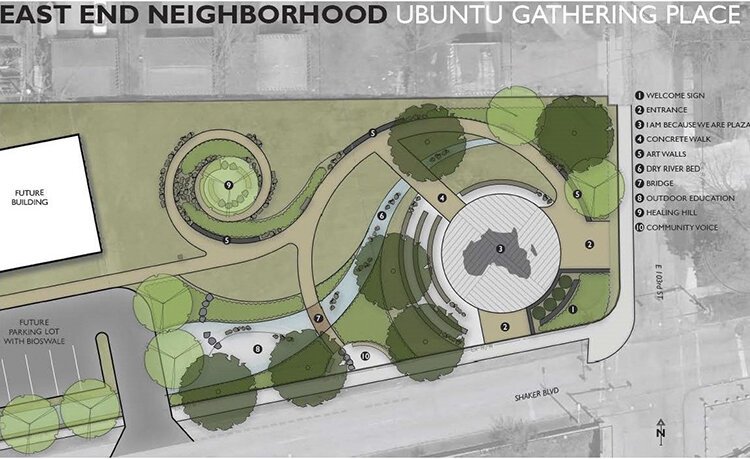Powerful connections: $75K grant launches the start of Ubuntu Gathering Space in Buckeye-Woodhill
 Western Reserve Land ConservancyConceptual design of the new Ubuntu Gathering Space in Cleveland
Western Reserve Land ConservancyConceptual design of the new Ubuntu Gathering Space in Cleveland
The Buckeye-Woodhill neighborhood has been hit hard over the years, falling victim to poverty, violence, racism, and overall blight. But thanks to fundraising, a recent grant, and a group effort, the neighborhood will soon be a little greener and residents will have a place to come together.
On Friday, July 23, Partners for Places, and program of The Funders Network, granted $75,000 to East End Neighborhood House, Burten, Bell, Carr Development, Inc., Western Reserve Land Conservancy, and the City of Cleveland Mayor’s Office of Sustainability for the construction of the Ubuntu Gathering Place, a new community park that will be built on the former Saab dealership at the corner of Shaker Boulevard and East 103rd Street.
The grant is in addition to funding from the Saint Luke’s Foundation, which exceeded the required match by donating $200,000 towards the $409,000 project.
The new space will be called The Ubuntu Gathering Place. “Ubuntu is a Nguni Bantu term meaning ‘humanity,’ sometimes best translated as ‘I am because we are,’” said East End Neighborhood House executive director Zulma Zabala in a statement. “It symbolizes the powerful connection that can exist between people who are open to seeing each other in each other. What we can accomplish for our community in this state of understanding can be magnificent.”
Isaac Robb, vice president of planning and urban projects for Western Reserve Land Conservancy, says East End has been working on this vision for about eight years, and Western Reserve Land Conservancy got involved about three years ago.
“It was brought to our attention when Zulma wanted to do a tree planting,” says Robb. “They had the land; they had the vision.”
LAND studio and Environmental Design Group also got involved in the project design, and the Cleveland Planning Commission approved the design of the park in October 2017.
“This new gathering space embodies the spirit of Ubuntu,” continued Zabala. “The organizations involved in the project are coming together for one common goal: to improve the health and lives of our community. This has been a vision for quite some time, and I am so excited to see our fundraising goals getting closer.”
Robb says Ubuntu, on a half-acre land, will include trees, a 5,300-square-foot plaza, bioretention cells, a green infrastructure outdoor education space, and murals done by local artists. He says a bioswale will help stop flooding and divert 300,000 gallons of stormwater from the sewer system—ultimately keeping it out of Lake Erie, where it pollutes the lake.
Robb adds that the team also hopes to include in the park an obelisk that was part of the Elevate the East public art project—further celebrating the community.
Phase I of construction is expected to begin later this year, while phase II is scheduled to begin in 2022.
The Buckeye-Woodhill neighborhood has faced tremendous challenges with high poverty rates, unemployment, poor health outcomes, crime, and racism. More than 95% of the neighborhood is Black, more than 58% of residents live below the poverty line, and the median household income is $15,000.
East End Neighborhood House has been through many of the changes. It was founded in 1907 as part of the settlement house movement when the neighborhood was predominately populated by Hungarian immigrants. From the 1940s through the 1970s, the neighborhood transitioned to predominately Black families as whites moved outside the city limits, largely the result of unjust housing policies and redlining.
Over time, as poverty increased, housing stock in Buckeye-Woodhill deteriorated and violence became prevalent. The effects of these historically discriminatory housing practices are still felt in the neighborhood today.
Historic disinvestment is apparent in the lack of high-quality green space and parks in Buckeye-Woodhill. By creating the Ubuntu Gathering Place to promote sustainability and social capital, the team hopes that pathways of opportunity will be created in a Cleveland neighborhood that has been overlooked.
“There isn’t a lot of green space in this part of the city,” says Robb. “By creating Ubuntu, we will be respectful in honoring the current heritage of the neighborhood by being respectful to the continent of Africa.”
Robb adds that the teamwork involved in making this project come to life has been incredible. “Through this set of partners, we’ll be able to provide this meaningful space for people to gather in this part of the neighborhood,” he says. “Through this design and all the engagement with both the community and the partners, we have an interconnected system that shows we are greater than the sum of our parts.”

